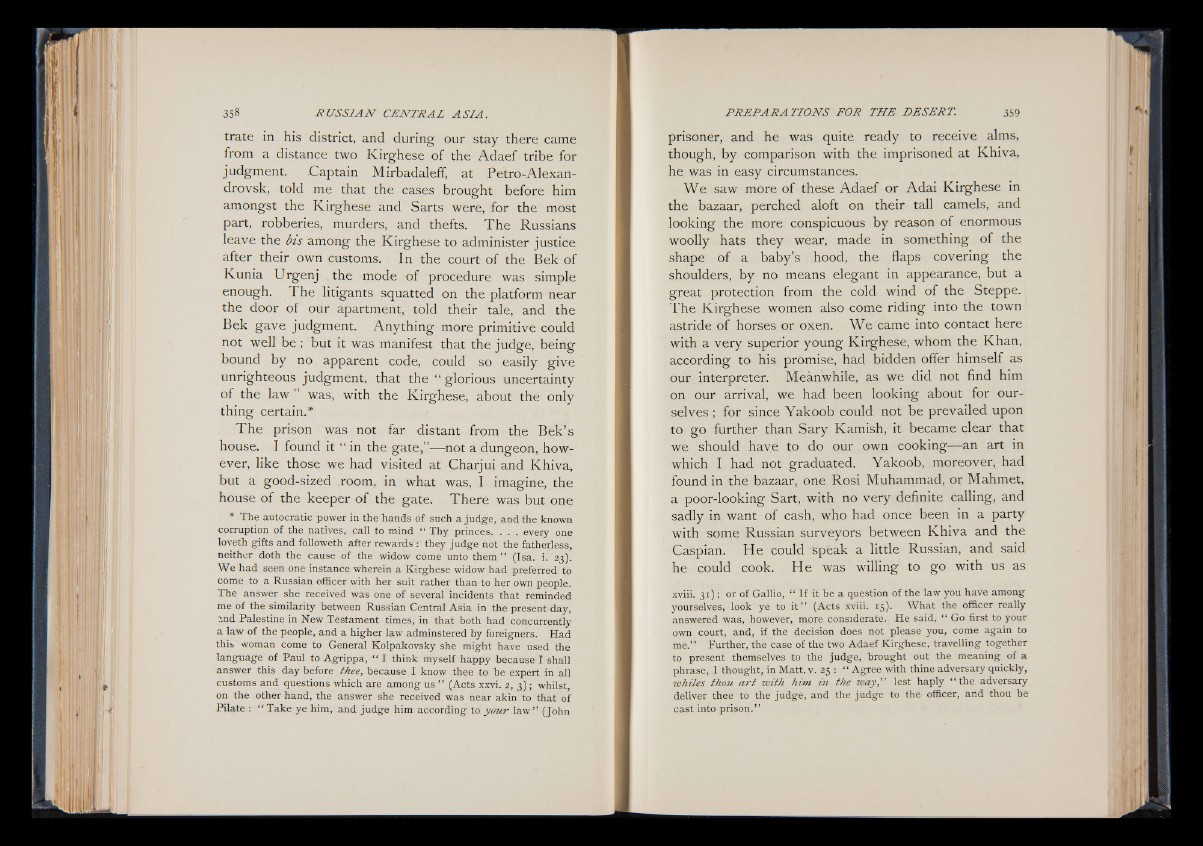
trate in his district, and during our stay there came
from a distance two Kirghese of the Adaef tribe for
judgment. .Captain Mirbadaleff, at Petro-Alexan-
drovsk, told me that the cases brought before him
amongst the Kirghese and Sarts were, for the most
part, robberies, murders, and thefts. T he Russians
leave the bis among the Kirghese to administer justice
after their own customs. In the court of the Bek of
Kunia Urgenj the mode of procedure was simple
enough. The litigants squatted on the platform near
the door of our apartment, told their tale, and the
Bek gave judgment. Anything more primitive could
not well be ; but it was manifest that the judge, being
bound by no apparent code, could so easily give
unrighteous judgment, that the “ glorious uncertainty
o f the law ” was, with the Kirghese, abdut the only
thing certain.*
T he prison was not far distant from the Bek’s
house. I found it “ in the gate,”— not a dungeon, however,
like those we had visited at Charjui and Khiva,
but a good-sized room, in what was, I imagine, the
house of the keeper of the gate. There was but one
* The autocratic power in the hands of such a judge, and the known
corruption of the natives, call to mind “ Thy princes. . . . every one
loveth gifts and followeth after rewards : they judge not the fatherless,
neither doth the cause of the widow come unto them ” (Isa. i. 23).
We had seen one instance wherein a Kirghese widow had preferred to
come to a Russian officer with her suit rather than to her own people.
The answer she received was one of several incidents that reminded
me of the similarity between Russian Central Asia in the present day,
?.nd Palestine in New Testament times, in that both had concurrently
a law of the people, and a higher law adminstered by foreigners. Had
this woman come to General Kolpakovsky she might have used the
language of Paul to Agrippa, “ I think myself happy because I shall
answer this day before thee, because I know thee to be expert in all
customs and questions which are among us ” (Acts xxvi. 2, 3); whilst,
on the other hand, the answer she received was near akin to that of
Pilate : “ Take ye him, and judge him according to your law” (John
prisoner, and he was quite ready to receive alms,
though, by comparison with the imprisoned at Khiva,
he was in easy circumstances.
W e saw more of these Adaef or Adai Kirghese in
the bazaar, perched aloft on their tall camels, and
looking the more conspicuous by reason of enormous
woolly hats they wear, made in something of the
shape of a baby’s hood, the flaps covering the
shoulders, by no means elegant in appearance, but a
great protection from the cold wind of the Steppe.
The Kirghese women also come riding into the town
astride of horses or oxen. W e came into contact here
with a very superior young Kirghese, whom the Khan,
according to his promise, had bidden offer himself as
our interpreter. Meanwhile, as we did not find him
on our arrival, we had been looking about for ourselves
; for since Yakoob could not be prevailed upon
to go further than Sary Kamish, it became clear that
we should have to do our own cooking— an art in
which I had not graduated. Yakoob, moreover, had
found in the bazaar, one Rosi Muhammad, or Mahmet,
a poor-looking Sart, with no very definite calling, and
sadly in want of cash, who had once been in a party
with some Russian surveyors between Khiva and the
Caspian. He could speak a little Russian, and said
he could cook. He was willing to go with us as
xviii. 31): or of Gallio, “ If it be a question of the law you have among
yourselves, look ye to i t ” (Acts xviii. 15). What the officer really
answered was, however, more considerate. He said, “ Go first to your
own court, and, if the decision does not please you, come again to
me.” Further, the case of the two Adaef Kirghese, travelling together
to present themselves to the judge, brought out the meaning of a
phrase, I thought, in Matt. v. 25 : “ Agree with thine adversary quickly,
whiles thou a rt with him in the way," lest haply “ the adversary
deliver thee to the judge, and the judge to the officer, and thou be
cast into prison.”